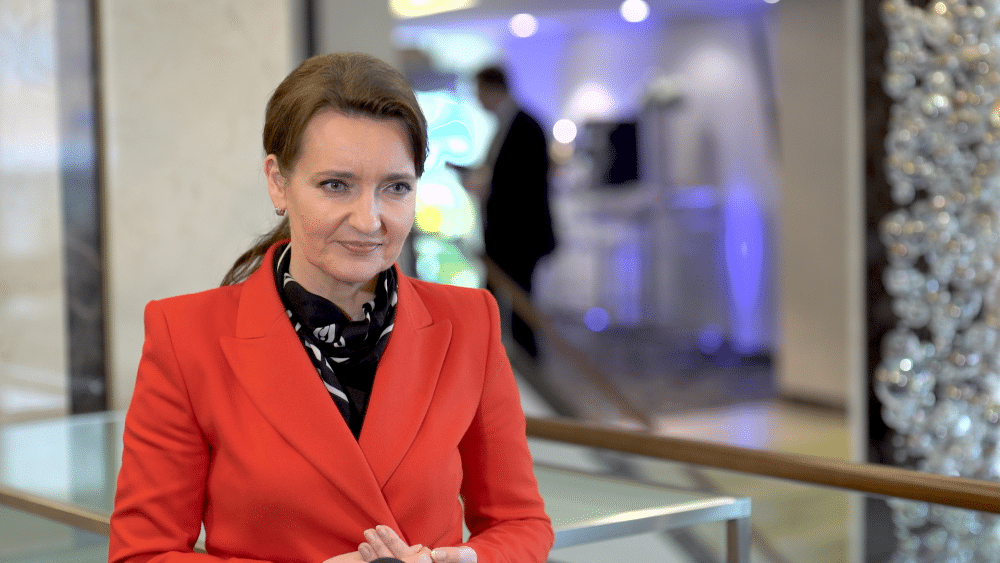In Poland, there are about 10 million people aged 60 and over. According to Eurostat data, only a small percentage of this group has basic digital skills, and a Digital Poland Foundation study found that 37% of Polish seniors consider using digital technology and the internet too complicated. “We have a lot to catch up on,” says Marzena Okła-Drewnowicz, Minister for Senior Policy. She highlights that broader education is needed in this group, with the involvement of, among others, public media. The new EU financial perspective opens the possibility of using a large pool of funds specifically for this purpose.
“All data related to the use of a computer or smartphone indicate that Polish seniors perform worse than seniors in other European Union countries,” says Marzena Okła-Drewnowicz to Newseria Biznes. “Only 6% of seniors use a computer. 57% use smartphones, but actually, 47% of this group uses keypad phones. However, the indicator concerning the ability to acquire knowledge, process this knowledge, acquire information in EU countries is around 25%, and in our country, it is above 10%, so we have a lot to catch up on.”
The “Path to the Digital Decade” program adopted last year defines the directions of the digital transformation of the EU and sets a number of digitization goals by 2030. One of them assumes that by then, 80% of Community citizens will have at least basic digital skills. At present, Poland is still far from achieving this goal, recording among the lowest results among all EU countries (third from the bottom). According to data published by Eurostat at the end of last year, 44% of Poles have basic digital skills, compared to the EU average of 56%. This percentage is even lower for seniors – only 13% of them have basic digital skills.
According to data cited by the Digital Poland Foundation – which argues that age is one of the main factors of digital exclusion – only 30.2% of Poles over 60 use the internet. Research for last year’s report “Technology in Service of Society. Will Poles Become Society 5.0?” also found that 37% of Polish seniors consider using digital technology and the internet too complicated. Experts suggest this calls for the adaptation of digital education and communication about new technologies to the needs of this age group.
“First of all, efforts should be disseminated, that is, reach various associations, organizations, universities of the third age or village housewives’ circles with information on how to acquire these digital skills. We also need to use public media for this purpose, as well as various guides, to bring this knowledge closer to people,” said the Minister of Senior Policy at TIME Economic Forum.
Research by Digital Poland for last year’s report “Technology in the Service of Society” shows that Poles consider digital skills key to professional success and simplifying daily life. However, the perception of new technologies varies by age. Older people often feel that technology is too complicated for them, though they simultaneously see many benefits in it – seniors seem to be more open to technological innovations such as health monitoring bands or surgeries performed by surgical robots. Compared to younger respondents, seniors are much less enthusiastic about solutions such as online shopping or unmanned stores.
“To increase digital competencies among seniors, we have the opportunity to use EU money. Therefore, we will – together with the Ministry of Digitization – build projects that will use EU funds to raise these digital competencies in Poland,” announces Marzena Okła-Drewnowicz. “There is also a need for legislative changes in the area of protection or security for seniors, in the case of fraud or scams which occurs on the largest scale in their case. This is a question of obviously the support of the Minister’s Office for Senior Policy, but also the Ministry of Justice, obviously with the participation of the Ministry of Digitization.”
As GUS reports, at the end of 2020, the number of seniors aged 60+ was 9.8 million (of which over 58% are women), and their participation in the Polish population reached 25.6%. This indicator is steadily growing. Projections suggest that in 2030, the number of people aged 60 and over will reach 10.8 million, and in 2050 – 13.7 million. Seniors will thus constitute about 40% of the Polish population.
